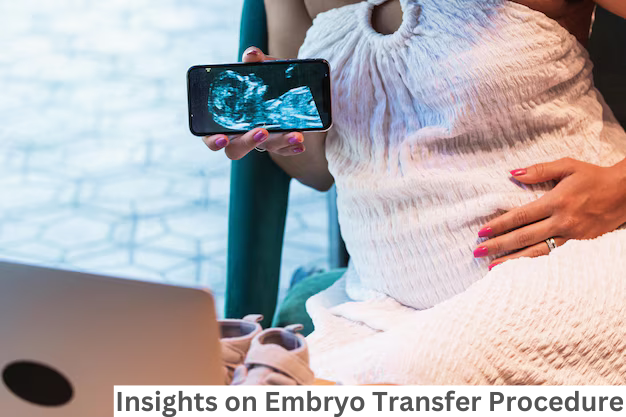Insights on Embryo Transfer Procedure
Embryo transfer is a crucial step in the In Vitro Fertilization (IVF) process. It's the moment when carefully nurtured embryos are gently placed into the woman's uterus, hoping for successful implantation and the beginning of a new life. At New World Fertility Centre in Delhi, our experienced team is committed to making this process as smooth and stress-free as possible.
The Procedure
The embryo transfer procedure is typically performed in an outpatient setting under ultrasound guidance. Here's a step-by-step breakdown:
1. Preparation:
Uterine Lining Preparation: Your doctor will monitor your hormone levels and use medications to prepare your uterine lining to be receptive to the embryo.
Embryo Selection: The embryologist will carefully select the healthiest embryos for transfer based on their development and quality.
2. Transfer Day:
Arrival: You'll arrive at the clinic on the scheduled day.
Ultrasound: A transvaginal ultrasound is performed to assess the uterine lining and identify the best location for embryo placement.
Catheter Preparation: A thin catheter is loaded with the selected embryos.
Transfer: The doctor gently inserts the catheter through the cervix and into the uterus. The embryos are then released into the uterine cavity.
3. Post-Transfer:
Rest: You'll be asked to rest for a short period after the procedure.
Follow-up: You may be advised to avoid strenuous activities and follow specific guidelines for a few days.
Pregnancy Test: A pregnancy test is usually scheduled 12-14 days after the transfer.
Factors Affecting Success
Several factors can influence the success of an embryo transfer:
Embryo Quality: The quality of the embryos, assessed by their morphology and developmental stage, plays a significant role.
Uterine Lining: A healthy and receptive uterine lining is essential for successful implantation.
Timing: The timing of the transfer, coordinated with the optimal window of implantation, is crucial.
Patient's Age: Age can impact the quality of eggs and, consequently, the success rate of IVF.
Underlying Medical Conditions: Any underlying medical conditions, such as endometriosis or uterine fibroids, may affect the outcome.
Tips for a Successful Embryo Transfer
Relaxation Techniques: Practice relaxation techniques like meditation or yoga to reduce stress.
Healthy Lifestyle: Maintain a healthy lifestyle, including a balanced diet, regular exercise, and adequate sleep.
Avoid Stress: Stress can negatively impact fertility. Engage in activities that help you relax and de-stress.
Follow Doctor's Advice: Adhere to your doctor's instructions regarding medications, lifestyle modifications, and follow-up appointments.
Positive Mindset: A positive and hopeful attitude can contribute to a positive outcome.
The Role of New World Fertility Centre
At New World Fertility Centre, we are committed to providing comprehensive fertility care, including advanced embryo transfer techniques. Our experienced team is dedicated to maximizing your chances of a successful pregnancy. We offer personalized treatment plans tailored to your specific needs and provide emotional support throughout your journey.
If you're considering embryo transfer, we encourage you to schedule a consultation with our fertility specialists. We'll discuss your medical history, evaluate your fertility options, and create a customized treatment plan to help you achieve your dream of parenthood.
Conclusion:
Embryo transfer is a significant milestone in the IVF journey. At New World Fertility Centre in Delhi, we strive to make this experience smooth, positive, and hopeful for every patient. By understanding the process, following expert advice, and keeping a positive outlook, you can enhance your chances of achieving a successful pregnancy. Reach out to us today to learn more or to start your fertility journey.
FAQs
1. What is the ideal number of embryos to transfer?
The number of embryos transferred depends on multiple factors, including the patient’s age, embryo quality, and past IVF attempts. Typically, younger patients may transfer one or two embryos, while older patients or those with multiple IVF attempts may transfer more, although your specialist will recommend the safest option for you.
2. Is the embryo transfer procedure painful?
Embryo transfer is generally a painless procedure. Some patients might experience mild discomfort similar to a Pap smear, but it is not usually painful. Most patients can return to their normal activities shortly afterward.
3. How long does the embryo transfer process take?
The actual embryo transfer typically takes about 5 to 10 minutes. Including preparation and post-transfer rest, patients may spend around 30 minutes at the clinic.
4. Are there any risks involved in embryo transfer?
Embryo transfer is a safe procedure, but like all medical processes, there can be minor risks, such as mild cramping or spotting. Complications are rare, especially when performed by experienced specialists at New World Fertility Centre.
5. What should I avoid after embryo transfer?
After the procedure, it's advised to avoid intense physical activities, alcohol, and caffeine. Rest is essential, and while mild activity is okay, it’s best to avoid heavy lifting or strenuous exercise.

 Nov-07-2024
Nov-07-2024